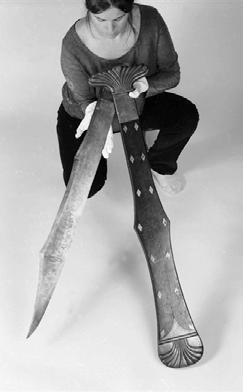
3 minute read
Augusta’s John “Bowie Knife” Potter A controversial congressman
by James Nalley
In 1860, at the 36th U.S. Congress in Washington, D.C., Illinois Congressman, and abolitionist Owen Lovejoy made several remarks in regard to the 1837 murder of his brother Elijah Lovejoy. After Wisconsin Congressman John Fox Potter made follow-up remarks, Virginia Congressman Roger Pryor edited Potter’s official remarks and eliminated any mention of the Republican Party. After Potter outrightly objected, Pryor challenged Potter to a gentleman’s duel. According to the article “The Pryor-Potter Duel” (1944) by William Hesseltine, Potter selected a Bowie knife as the prospective weapon, causing the duel to be cancelled and his choice of weapon to be referred to as “vulgar, barbarous, and inhuman.” Over time, he had earned the nickname “Bowie Knife Potter.”
Advertisement


John Fox Potter was born in Augusta (then Massachusetts), on May 11, 1817. He attended local public schools, but completed high school at Phillips Exeter Academy in Exeter, New Hampshire. After his marriage to Frances Elizabeth Lewis from Portland the couple (along with her father and unmarried sisters) moved to a farm in Wisconsin.
After he was admitted to the Wisconsin bar in 1837, Potter began his legal practice in East Troy. He eventually served a judge in Walworth County from 1842 to 1846. Over the next de- cade, he became increasingly involved in politics as a Whig. In 1856, he was elected as a member of the Wisconsin State Assembly, and he served as a delegate at the Whig National Convention in the same year. After the Whig Party failed to develop an effective campaign platform and was dissolved later that year, Potter became a Republican. Wisconsin voters then elected Potter to the U.S. House of Representatives, after which he won re-election twice.
It should be noted that this was a particularly turbulent time in Congressional history. According to the Wisconsin Historical Society (WHS), “Conflicting ideologies, customs, and personalities threatened to tear Congress apart. The issues of slavery and states’ rights deeply divided the nation’s lawmakers, and debate and compromise routinely yielded to verbal confrontations, personal humiliations, and physical assaults.” In this hostile environment, Congressman Lovejoy from Illinois gave a fiery anti-slavery speech (with mention of the murder of his brother), after which Congressman Pryor from Virginia objected to the former’s demeanor. Then, in Lovejoy’s defense, John Potter argued that he was fully allowed to express himself. Several days later, Pryor and Potter bickered with one another about the official record of the incident, which the former had edited.
As stated by the WHS, on April 8, 1860, “Believing that Potter offended his honor, Pryor challenged him to a duel, after which Potter accepted the fight and chose a Bowie knife.” After Pryor stated that his selection of weapon was “vulgar, barbarous, and inhuman,” Potter replied, “The custom of dueling itself is barbarous and inhuman.” Eventually, “the District of Columbia police arrested both men to keep the peace. The duel never occurred.”
Naturally, the print media sensationalized the event, with Northern newspapers condemning the duel as a vulgar Southern practice. Meanwhile, Potter’s Democratic opponents in Wisconsin demanded his resignation and accused him of political grandstanding. As for the Republicans, they made Potter a hero, after which supporters from across the country sent him knives of every size in honor of his newly acquired nickname.
From May 16 to 18, 1860, the Republican Party held its National Convention in Chicago, Illinois, where it nominated Abraham Lincoln for President. According to the WHS, “At the convention, delegates from the slave state of Missouri presented Potter with a 31-pound, 6-foot-long folding knife to commemorate his ‘victory’ over Pryor. It was the highlight of the convention and it earned national press exposure when it was dubbed the ‘monster (cont. on page 30)
(cont. from page 29)
Bowie knife.’”
Eventually, and ironically, Potter was considered one of the “Radical Republicans,” due to his support for African American civil rights and his belief that slavery should eventually be banned. In February 1861, Potter was one of 131 American politicians at the Peace Conference of 1861. The purpose was to avoid the secession of the eight slave states, which had not done so as of that date. Their meeting failed and it paved the way for the U.S. Civil War in April of that year.
Much like today, when a politician is somewhat controversial, a challenger appears. In 1862, Potter was challenged and defeated in his race for re-election by fellow Maine-born lawyer and Democrat James Brown. When he left office in January 1863, he declined an appointment as Governor of the Dakota Territory (the northernmost part of the land acquired in the Louisiana Purchase). Later that year, the Lincoln administration appointed Potter as Consul General of the United States in the British-controlled Province of Canada from 1863 to 1866. At that time, Potter resided in the city of Montreal.
In 1866, Potter returned to East Troy, Wisconsin, where he resumed his legal practice. On May 18, 1899, Potter died at his home. He was 82 years of age. As for his legacy, Potter kept the oversized knife in his home until too many visitors started to annoy him. He eventually donated the knife to Lawrence College in Appleton, after which the college donated it to the WHS in 1957. Interestingly, on one side of the knife, the engraving reads “Presented to John F. Potter of Wisconsin by the Republicans of Missouri 1860.” However, the other side of the knife reads, “Will always meet a Pryor engagement.”




















